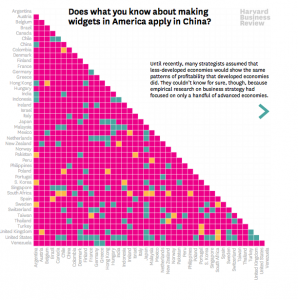Most seasoned global professionals know that adaptability to one’s surroundings is a key competency for career success. When it comes to those in leadership positions, this is especially true. Those who work across cultures soon learn that an organization’s institutional character can vary by location just as much as language, geography, and economic conditions. And while most professionals are aware that cultural differences exist, many continue to apply the skills they learned in their home countries, to a new business culture, often with disappointing results.
A recent piece in the Harvard Business Review sheds light on the importance of contextual intelligence and how it serves those in the global workforce. “Trying to apply management practices uniformly across geographies is a fool’s errand,” says author, Tarun Khanna. “Once you drill below the homilies, differences quickly emerge over what constitutes value and how to motivate people.”
The bottom line is that even the most experienced individuals in the business world tend to grossly overestimate their ability to succeed in other cultures. In the early 90s, economists did a study on OECD-member countries and concluded that similar industries across these countries had similar structures and profit margins. However, when data from non-OECD countries became available, those results could not be replicated. It became apparent that knowing something about a particular industry in a particular country was no guarantee that one could predict its performance elsewhere in the world.
The findings of that research can also be applied to individuals. The development of contextual intelligence -- particularly as it pertains to cultural differences -- can be what makes or breaks even the most intrepid global executive. That means being aware of local customs, religion, and aesthetic preferences. On a deeper level, it also means being prepared to navigate the convoluted landscape of culture in a way that allows you to engage successfully with your colleagues, business partners, and clients.
How well does your business acumen apply to other cultures? Have you ever had to change your work or management style to succeed in another culture? What did you learn from this experience?


